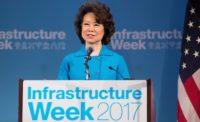In a summary paper, the Trump administration is proposing to overhaul the federal role in funding highways and other infrastructure, but the document is thin on specifics, and it will be up to Congress to determine whether to make changes in current policies.
The administration on May 23 released its fiscal year 2018 budget proposal and a six-page fact sheet about the not-yet-released infrastructure program.
The budget reiterates officials' earlier comments that Trump will seek $200 billion over 10 years for infrastructure, aiming to use those funds to stimulate at least $800 billion more from the private sector.
The document lists four principles: focus federal investment on important national and regional projects, encourage "self-help" infrastructure funding by states and localities, shift infrastructure investment responsibilities away from the federal government and draw on private-sector dollars.
Transportation Secretary Elaine Chao on May 23 told reporters that the four tenets are significant but not the administration's final word on the subject. She said, "We expect to have more details forthcoming," adding that officials also hope to produce a legislative package in the third quarter of the year.
Steve Hall, American Council of Engineering Companies vice president for government affairs, says the fact sheet is "the first of what we expect to be several products that come from the White House over the next several months that feed into this infrastructure initiative."
Jay Hansen, National Asphalt Pavement Association executive vice president, says, "This is a good thumbnail sketch of some ideas that they’re talking about in an [upcoming] infrastructure bill. But we don’t see enough detail here to be able to say, 'This is what it means for the marketplace.' "
ACEC's Hall agrees, saying, "We need some more details, and, honestly, I think Congress would be happy to fill in some of those details, reflecting the views of lawmakers in individual states."
Indeed, Senate Environment and Public Works Committee Chairman John Barrasso (R-Wyo.) has said his panel has begun to work on an infrastructure measure and won't wait for the administration to act.
Barrasso has emphasized that public-private partnerships for infrastructure—something Trump's team has pushed for—aren’t as applicable in rural states as in urban areas. Rural areas need direct federal funds, the head of Wyoming's DOT told Barrasso's committee earlier this year.
The fact sheet notes that the budget also includes several targeted infrastructure proposals. They include shifting air-traffic-control responsibilities from the Federal Aviation Administration to a new nonfederal entity; giving the Dept. of Veterans Affairs more flexibility in its health-care facilities; divesting federal Power Marketing Administration power lines, towers, substations and rights-of-way; and raising fees for commercial use of inland waterways.
TIFIA and WIFIA
The document also lists other infrastructure proposals not contained in the budget, such as increasing funds for the 19-year-old Transportation Infrastructure Finance and Innovation Act (TIFIA), which provides low-interest federal loans for highway, transit and other projects, and continuing to fund the similar Water Infrastructure Finance and Innovation Act (WIFIA). That program, which the Environmental Protection Agency manages, provides loans for drinking-water, wastewater-treatment and other projects. It was authorized in 2014 but not funded until 2016 and has yet to approve any loans.
In addition, the outline calls for removing the Dept. of Transportation’s $15-billion national cap on the volume of private-activity bonds used to help finance highway and freight-transfer infrastructure. It also calls for ending the general ban on imposing tolls on existing interstate highways.
Lifting the tolling ban "would be dynamic for the market," says Hansen, noting that the move would give the states tools to generate revenues to back bonds or enter P3s.
But Hansen adds, "Now, can Congress do it? We know how contentious that [tolling issue] is." One major transportation group, the American Trucking Associations, opposes allowing tolls on existing interstates.
The fact sheet also reiterates repeated comments by administration officials that the coming initiative also will include steps to speed up federal agencies' project reviews and procedures for granting permits.




Post a comment to this article
Report Abusive Comment